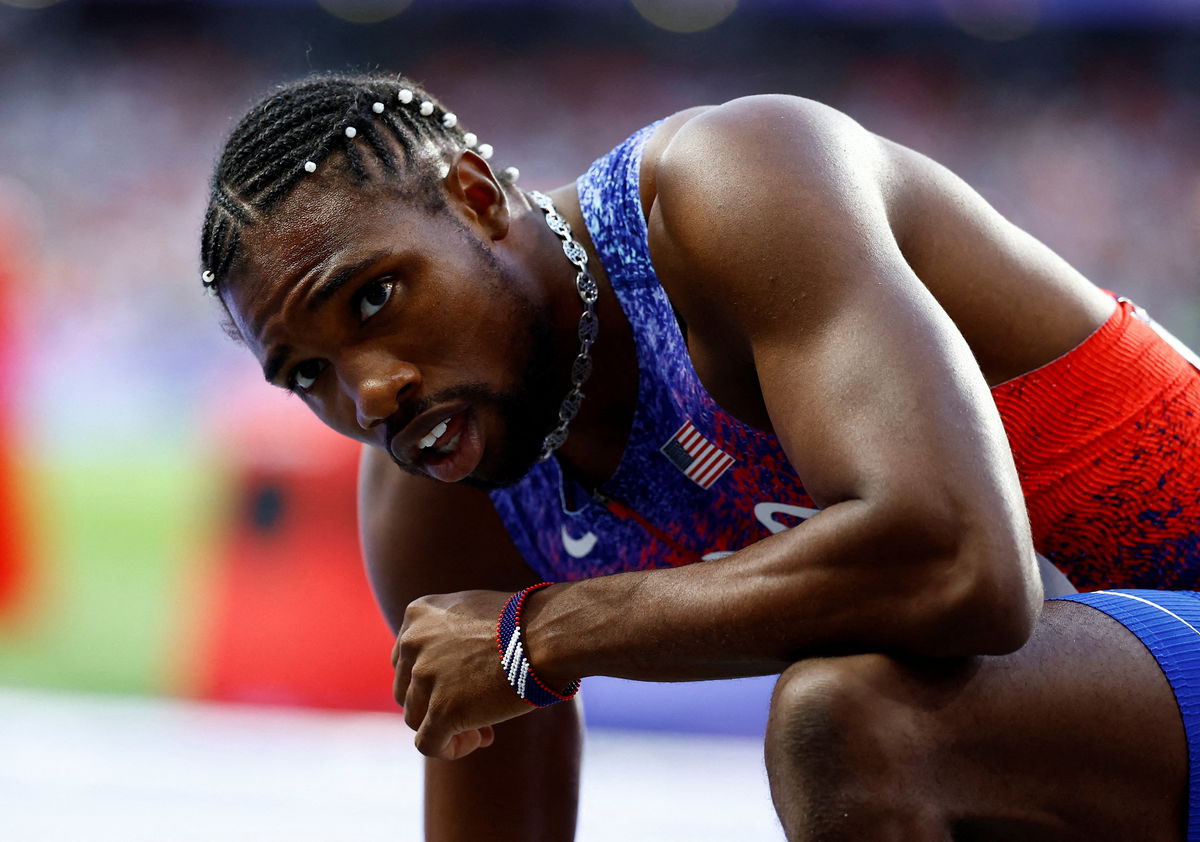
Reuters
Paris 2024 Olympics – Athletics – Men’s 200m Final – Stade de France, Saint-Denis, France – August 08, 2024. Noah Lyles of United States reacts after winning bronze before receiving medical attention. REUTERS/Sarah Meyssonnier TPX IMAGES OF THE DAY

Reuters
Paris 2024 Olympics – Athletics – Men’s 200m Final – Stade de France, Saint-Denis, France – August 08, 2024. Noah Lyles of United States reacts after winning bronze before receiving medical attention. REUTERS/Sarah Meyssonnier TPX IMAGES OF THE DAY
Many had hoped the Paris Olympics would mark a return to normalcy post-Covid, but instead, they seem to have become a showcase of indifference toward the virus. Noah Lyles was a heartbreaking reminder of one such instance after he won a bronze medal in the 200m race despite battling COVID-19. Although the sprinter did not disclose his diagnosis before the race, it was revealed afterward as we saw a distressing moment at the track.
Watch What’s Trending Now!
Prior to the race, Lyles had taken all possible precautions—hydrating, resting, and preparing himself. Yet, the aftermath was stark. Known for his vibrant energy, Lyles collapsed onto the track, struggling to catch his breath as he’s already known to have severe asthma since his childhood on top of the Covid diagnosis. He rolled onto his side, then to his hands and knees, before finally managing to stand, albeit wobbly, and signaled for water from the medics, who were slow to respond.
Imagine how seeing such a painful moment would pan out for any mother. For Noah Lyles’ mother, Keisha Caine Bishop—also a former track athlete—it was a firsthand experience of helplessness.
On August 11, Keisha shared a harrowing Instagram photo showcasing her son lying on the track, exhausted and clutching his chest as he struggled to breathe. “This was one of the scariest moments of my life! Watching my son hold his chest gasping for air while the stadium security refused to call a doctor as I begged them to send him help. They also refused to do anything to help. They totally ignored me! No parent should ever have to experience this feeling of helplessness!” the caption started.
View this post on Instagram
It further continued: “However, I want to thank the @nbcolympics team for helping me during this moment. Thank you for seeing me & my son as human beings and not just another story. Words cannot express my gratitude for your empathy, professionalism, and kindness. Also thank you @usatf staff who let me cry on their shoulders. To the security team, I pray if your loved one ever needs help, they get treated better than you treated us. I also thank God he is getting better.” Thankfully, Lyles was quickly attended to by medical staff and was eventually placed in a wheelchair and taken out of the stadium.
The question remains: Why did he take such a risk to race in the first place, considering the risks of spreading the virus and the existing policies?
What is the COVID-19 policy in Paris?
“My first thought was not to panic…And we just took it day by day, trying to hydrate as much, quarantined off. And I’d definitely say it’s taken it’s toll for sure, but I’ve never been more proud of myself,” said Noah Lyles as he described his immediate reaction after the diagnosis. While he seems to have no regrets obout competing despite the highly contagious disease, the community hasn’t shied away from calling him out.
Blamed for “exposing everyone around him” it’s a critical conjuncture the athlete stands at, in spite of his promising results. But, did he break any rules by participating?
The lack of a universal COVID-19 policy at the Paris Games means that athletes who test positive can still participate, as long as they follow certain protocols. According to reports, at least 40 athletes have already tested positive for the virus including British swimmer Adam Peaty, and five water polo athletes from Australia.
Scientific American notes that, unlike Tokyo, there is no mandatory testing for athletes in Paris. Masks are encouraged but not required, and COVID-positive athletes are given single rooms. International Olympic Committee president Thomas Bach had a rather interesting take on the matter, saying, “COVID, not only here in France, is being treated like any other respiratory disease. It is being treated like a flu now, so there is no obligation for any special measures or notifications. The (national teams) and the athletes have already taken the measures they deemed appropriate.”
As for Lyles, United States Olympic & Paralympic Committee’s CEO Sarah Hirshland stated, “We gave Noah as much flexibility in his own choices as we could. He had every opportunity to say, ‘I don’t want to compete. I don’t feel good enough to compete, or, I don’t want to compete’.”
The U.S. track federation and the USOPC adhered to all relevant guidelines, stating that Lyles chose to compete after a thorough medical evaluation. Lyles admitted that his performance was affected by the virus, which was evident.
This is the second consecutive Olympics where the virus has significantly impacted Lyles’ experience, following a challenging time at the Tokyo Games due to empty stands and delays. Well, with that being said, we wish him a speedy recovery!

